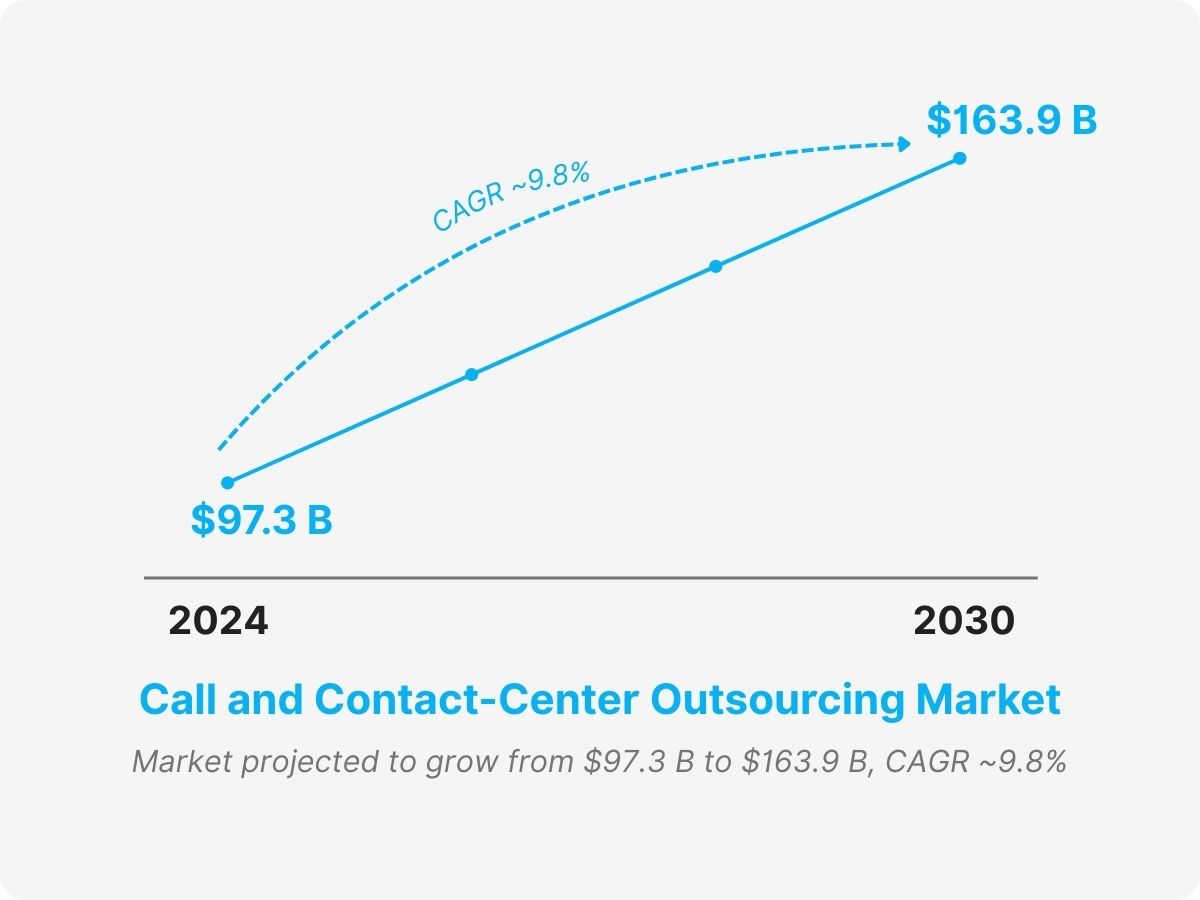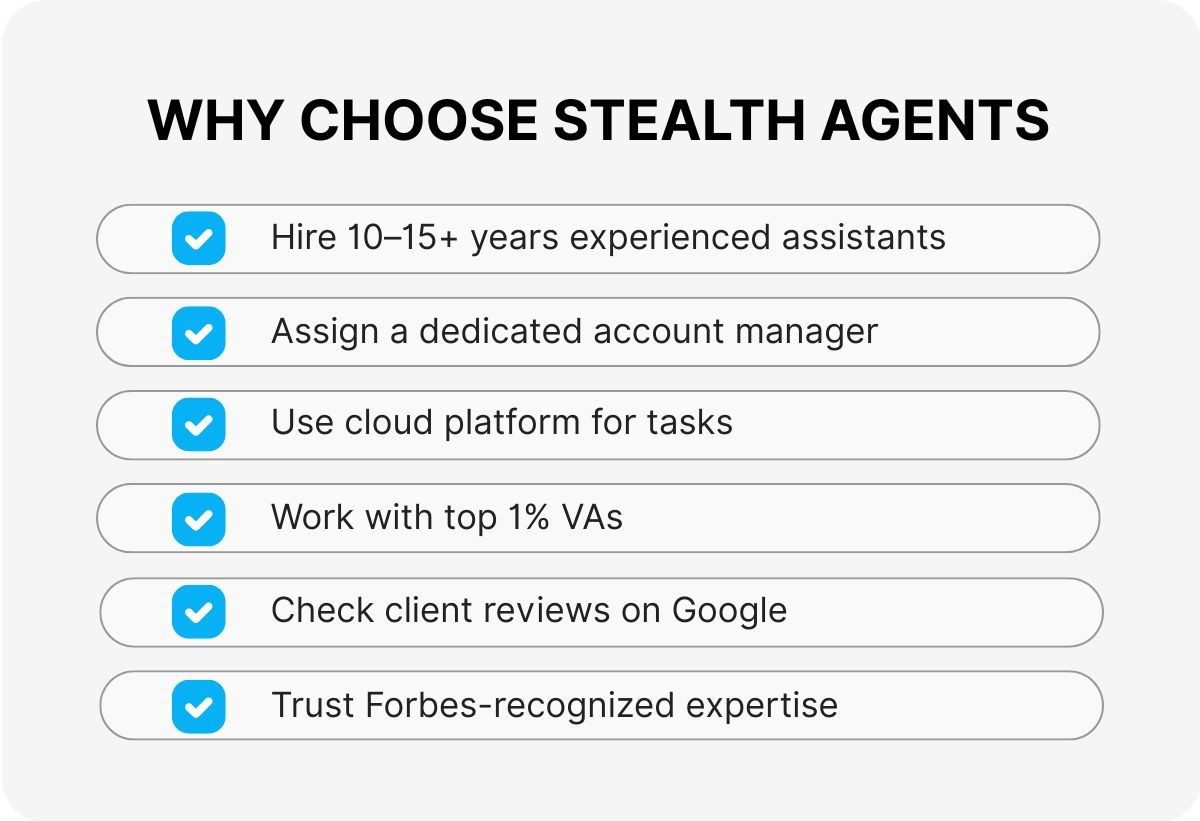You started your business to build something great, not to be stuck on the phone all day. Yet, as your company grows, so does the volume of calls, emails, and customer questions. Suddenly, you are spending more time putting out fires than focusing on the strategy that got you here in the first place.
This is where many business owners hit a wall. You want to offer excellent support, but hiring a full in-house team is expensive and time-consuming. You have to worry about salaries, training, equipment, and what happens when someone calls in sick. It is a headache that distracts you from your main goals.
Fortunately, there is a better way to handle the noise. Outsourcing your call center operations allows you to hand off those daily interactions to pros who do this for a living. By choosing the right partner, you can ensure your customers are happy while you get back to running your business.
This guide will walk you through the top options available to ensure you find the best call center price rate and how to pick the right one for your specific needs.
Why Outsourcing Call Centers Is Critical
For a growing business, the pressure to be available 24/7 is real. Customers expect immediate answers whether it is 2 PM or 2 AM. If you rely solely on a small in-house team or yourself, you are going to miss opportunities. Outsourcing allows you to extend your hours and availability without burning out your current staff.
The cost of running an internal call center adds up fast. You are not just paying an hourly wage; you are paying for benefits, office space, computers, and management software. When you outsource, you typically pay a set rate for the service. This cuts down your overhead significantly and makes your monthly expenses much more predictable.
Scalability is another massive factor. During busy seasons, your call volume might double or triple. An in-house team can’t handle that sudden spike without you hiring temporary staff, which takes weeks.
An outsourcing partner has the resources to add more agents to your account instantly, ensuring you never miss a beat during your busiest times.
Criteria to Choose the Best Call Center Outsourcing Company
Not all call centers are created equal. When you are looking for a partner, the first thing to check is their experience. You want a company that has been around the block and understands your specific industry. A provider that specializes in healthcare might not be the best fit for an e-commerce retail store.
You also need to look at the range of services they provide. Some companies only do inbound support, meaning they answer calls when customers ring. Others offer outbound sales, technical support, and helpdesk features. You need a service that can handle your current needs but also has the ability to grow with you as you expand into new areas.
Technology and quality assurance are the final pieces of the puzzle. The best companies use modern CRM systems and AI-assisted support to make sure every interaction is smooth.
Ask about their quality metrics, such as First Call Resolution (FCR) and Customer Satisfaction (CSAT) scores. These numbers tell you if they actually resolve problems or just rush customers off the phone.
op Call Center Outsourcing Companies
Here are the top providers that can help manage your customer interactions efficiently.
1. Stealth Agents
Stealth Agents provides dedicated virtual assistants and call center support tailored specifically for small to medium-sized businesses. Their agents are rigorously vetted and trained to handle everything from inbound customer service to outbound lead generation with a high level of professionalism. They offer flexible pricing models that make it easy for growing companies to get started without massive upfront costs.
Website: www.stealthagents.com
2. Accenture
Accenture is a massive global firm that offers high-end business process outsourcing services for large enterprises. They use advanced technology and data analytics to improve customer experiences and streamline complex operations for big corporations. If you have a huge budget and need a partner that can handle thousands of calls globally, this is a strong option.
Website: www.accenture.com
3. Teleperformance
Teleperformance is one of the largest digital business service companies in the world, known for its massive workforce. They specialize in omnichannel customer experience management, meaning they handle support across phone, social media, and chat. They are a solid choice if you need support in multiple languages and across various time zones.
Website: www.teleperformance.com
4. SupportYourApp
This company focuses heavily on tech startups and software companies that need specialized technical support. They act as an extension of your brand and create a support team that sounds exactly like your own employees. Their focus is on high-quality, personalized communication rather than just volume.
Website: www.supportyourapp.com
5. Helpware
Helpware creates custom teams for modern companies, focusing on culture fit as much as skill sets. They offer a mix of back-office support and customer facing roles, giving you a comprehensive solution for your operations. Their approach is very hands-on, allowing you to be involved in the selection of your agents.
Website: www.helpware.com
6. TTEC
TTEC combines humanity with technology to deliver customer experience as a service for large brands. They utilize a lot of proprietary AI and automation tools to speed up resolution times and improve customer happiness. This provider is best suited for organizations that want to modernize their entire customer journey.
Website: www.ttec.com
7. Concentrix
Concentrix is another industry giant that focuses on improving business performance and customer engagement. They have a presence in dozens of countries, making them ideal for businesses that have a global customer base. They cover everything from marketing services to technical helpdesk support.
Website: www.concentrix.com
8. Upwork
While not a traditional call center, Upwork allows you to hire freelance customer support agents directly. This gives you total control over who you hire and how much you pay, but it requires more management on your part. It is a good option if you only need one or two people and want to manage them yourself.
Website: www.upwork.com
Why Choose Stealth Agents
At Stealth Agents, we combine world-class talent, cutting-edge tools, and unmatched service to help you scale faster and work smarter. Our team is handpicked from the top 1% of virtual assistants, ensuring you get the expertise and professionalism you deserve. Recognized by Forbes and praised by clients worldwide, we are committed to delivering results you can trust.
Highlights:
- Hire 10–15+ years experienced executive assistants – Gain the advantage of seasoned professionals who understand complex business needs and deliver high-level support.
- Dedicated account manager – Enjoy personalized guidance and a single point of contact for seamless communication and project management.
- Cloud platform – Access and manage your tasks anytime, anywhere, with our secure and user-friendly platform.
- Best reviews on Google – Join hundreds of satisfied clients who rate us highly for reliability, efficiency, and outstanding results.
- Top 1% virtual assistants – Work with elite talent who consistently exceed industry standards.
- Recognized by Forbes as one of the top virtual assistant servTrust Trust is a brand celebrated for excellence and proven impact
How to Evaluate and Compare Call Center Providers
Once you have a shortlist, you need to dig deeper to find the perfect match. Start by checking their certifications and compliance standards. If you are in a sensitive industry like finance or healthcare, the provider must meet strict security regulations.
Next, look for social proof. Read through client reviews on third-party sites and ask the company for case studies. You want to see proof that they have helped businesses similar to yours succeed. If they can’t show you examples of their past wins, that is a red flag.
Finally, review their Service Level Agreements (SLAs) and time zone coverage. The SLA outlines exactly what you can expect in terms of response times and quality.
You also need to ensure they can work during the hours your customers are most active. For a deeper look at what to expect from these partnerships, you can read more about outsourced customer support services to see how they integrate with your workflow.
Conclusion
Outsourcing your call center is one of the smartest moves you can make to regain control of your time.
It allows you to provide professional, round-the-clock support without the financial burden of managing an internal department. By choosing a partner like Stealth Agents, you ensure that your customers are treated with care while you focus on the big picture.
Don’t let administrative tasks hold you back any longer; finding the right partner is the key to unlocking your next level of growth.
Outsourcing your call center can save you time and money. Stealth Agents have skilled VAs ready to help with customer service and more. Get started today to find your perfect fit.
Frequently Asked Questions
What factors influence the cost of outsourcing call center services?
The cost of outsourcing your call center depends on several factors. Key considerations include the provider’s location (nearshore vs. offshore), the specific language skills required, the technical complexity of the calls, whether you need after-hours support, and the length of your contract.
How long does it take to implement call center outsourcing with leading companies?
It typically takes 2-4 weeks to set up call center outsourcing. This includes consultation (1-3 days), agent training (1-2 weeks), system setup and testing (3-5 days), and go-live support. Complex setups or special industry needs may take 6-8 weeks.
Which call center outsourcing companies offer the best data security and compliance?
Top companies like Teleperformance, TTEC, and Stealth Agents follow strict security rules, including SOC 2 Type II, HIPAA, PCI DSS, and GDPR compliance. They use encrypted systems, secure data centers, regular security checks, and strict access controls to protect customer information.
What industries benefit most from call center outsourcing companies?
Industries like healthcare, financial services, e-commerce, telecommunications, and insurance benefit the most. These sectors handle large call volumes, need 24/7 support, require compliance with strict rules, and save money while keeping service quality high.
How do call center outsourcing companies handle peak season demand fluctuations?
Top companies can quickly increase staff by 50-200% during busy times. They keep extra trained agents ready, use overflow systems, balance workloads across locations, and manage schedules in real time to handle seasonal spikes without affecting service quality.
What technology integrations do top call center outsourcing companies support?
Leading companies work with tools like CRMs (Salesforce, HubSpot), helpdesk platforms (Zendesk, ServiceNow), telephony systems (Avaya, Cisco), and custom APIs. They also support omnichannel platforms, AI chatbots, call recording, and real-time analytics for smooth operations.
Which call center outsourcing companies provide the fastest response times?
Top companies answer most calls within 20-30 seconds, with 80% of calls picked up in under 20 seconds. Providers like Stealth Agents maintain high response rates (92%) by using advanced call routing, predictive dialing, and well-planned agent schedules.
What contract terms should you expect with call center outsourcing companies?
Contracts usually range from 6-month trial periods to 3-year agreements. They include service level agreements (SLAs), performance goals, cancellation terms, data protection rules, and price limits. Month-to-month options are available but often cost 15-25% more.
How do you measure ROI when working with call center outsourcing companies?
ROI is measured by cost savings (usually 30-50%), better customer satisfaction, higher first-call resolution rates, shorter call times, and more revenue per call. Most businesses see positive results within 3-6 months of starting.
What backup and disaster recovery plans do call center outsourcing companies have?
Top companies have multiple locations, cloud-based systems, backup internet, and work-from-home setups. They ensure 99.9% uptime with automated backups, real-time monitoring, and plans to keep services running during emergencies or technical problems.













